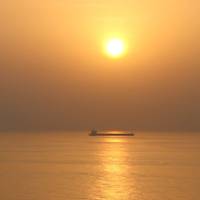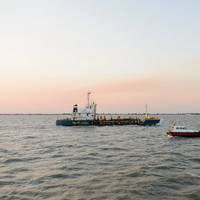Strait of Hormuz: The World's Most Important Oil Artery

The Israel-Hamas war has raised the spectre of a wider regional conflict which could embroil Iran and other regional factions.Analysts and market observers say the conflict could prompt the United States to tighten sanctions on Iran, which may spur Tehran to take retaliatory action against ships in the Strait in Hormuz.The Marshall Islands registry, one of the world's top shipping flags, last week flagged that vessels with links to Israel or the United States may face a heightened threat of attack within Israeli territorial waters…
Coronavirus hits Supertanker Rates

Freight rates for supertankers on the Mideast Gulf and U.S. Gulf routes to Asia have fallen to their lowest since mid-September as the coronavirus outbreak hit Chinese oil demand, ship brokers told Reuters.China's Sinopec Corp, Asia's largest refiner, and so-called "teapot" independent refineries have reined in operations in the face of plunging consumption."The market has gone back to what it was before the COSCO sanctions came in," one ship broker said, referring to U.S. sanctions on subsidiaries of the state-owned Chinese shipping company."All the other variables have gone away…
U.S. Shipping Sanctions Give Boost to EU Refiners

U.S. sanctions imposed last month on subsidiaries of vast Chinese shipping fleet Cosco have given an unexpected boost to European refiners as less crude oil from the North Sea and West Africa heads east, traders and analysts said.Freight rates have soared as oil producers scramble for non-blacklisted vessels, discouraging longer-distance voyages.Complex refining margins for advanced facilities capable of extracting even more valuable products like diesel and gasoline, have been especially strong in Europe, industry sources said.The U.S.
GP Global Delivers its First LSFO Bunker Fuel in Fujairah

Oil trader and bunker provider GP Global delivered its first barge of low-sulphur fuel oil compliant with IMO regulations on sulphur emissions into Fujairah in the United Arab Emirates, it said on WednesdayThe company delivered a 6,000-tonne bunker barge at the port, a main hub in the Mideast Gulf region for bunker operationsFrom the start of 2020 all ships will be required to burn fuel with maximum 0.5% sulphur, down from 3.5% sulphur currently, unless they have sulphur cleaning kits called scrubbers, according to International Maritime Organization regulations (Reporting by Ahmad Ghaddar; Ed
Private Security in Mideast Gulf Discouraged
Shipping companies sailing through the Middle East Gulf are being urged to avoid having private armed security guards onboard as the risk of escalation in the region rises, industry associations say.Relations between Iran and the West have become increasingly strained after Britain seized an Iranian tanker in Gibraltar last week and London said its warship HMS Montrose had to fend off Iranian vessels seeking to block a British-owned tanker from passing through the Strait of Hormuz.The most recent incidents followed a spate of attacks on tankers since May around the Strait of Hormuz and the Gulf of Oman, which the United States has blamed…
Tanker Attacked in Mideast Gulf Reaches UAE Port Safely
Singapore-flagged oil products tanker Alpine Eternity has reached the port of Jebel Ali in the United Arab Emirates safely after coming under attack in the Gulf earlier, the vessel's manager said on Thursday. A spokesman for the vessel's Norwegian manager Transpetrol said the vessel was attacked at sea at 0800 GMT on Thursday on its way to the UAE port of Fujairah. "The nature of the attack is still unclear," the spokesman said. "She reached UAE waters and she is in the port of Jebel Ali now. The vessel is safe and there are no injuries to crew." The spokesman said the attack had been reported to Singaporean authorities. (Reporting by Jonathan Saul; Editing by Toby Chopra)
U.S.-Asia Crude Exports Stall on Cheap Mideast Oil
Asian refiners shift towards cheaper Mideast oil, naphtha-trade; U.S. light oil exports to Asia only started 4 months ago. U.S. exports now going to Europe instead. An aggressive strategy by Mideast Gulf producers to exploit the lowest oil prices in five years to defend market share is showing signs of bearing fruit as U.S. crude exports to Asia grind to halt. Asian refineries have suspended imports of condensate, a light crude oil produced from the U.S. shale boom, just four months after they began in favour of cheaper Middle East grades, according to trade and industry sources. The suspension illustrates how competition between suppliers has heated up following a more than 40 percent decline in oil prices since June.
Tanker Market Remains High In Atlantic Basin
Tanker action was again focused in the Atlantic Basin this week, and though VLCCs edged in on the West African market, million-barrel tankers shrugged off the competition. Six VLCC cargoes were fixed from West Africa, two of them heading east and four of them heading west. While usually this would erode demand for million-barrel ships and therefore rates, the million-barrel market actually gained eight points during the week to close at W228. Million-barrel tanker rates also showed resilience in the Mediterranean, where they gained nine points during the week to reach W213 in spite of the stand-off between the U.N. and Iraq. Smaller dirty tankers fared less well in the Mediterranean, losing several points to stand at W255 for modern vessels.
Tanker Market Crawls Back To Work
As charterers crawled slowly back to their offices this week, brokers said they were struggling to ascertain where exactly the market stood. Uncertainty over the size of future OPEC cuts, continued Iraqi delays as well as renewed talk of recession in the U.S. all conspired to create doubt over short-term tanker demand. VLCCs heading West from the Mideast Gulf were fetching W100, while those going East were fetching W127, brokers said. Though this looks like a huge drop compared to the W182 that eastbound VLCCs were demanding during the first week of December, the figures are incomparable after the Worldscale Association completed its annual adjustment of flat rates on January 1. Brokers said on Friday that rates should rally when Saudi Aramco releases its cargo nominations next week.
VLCC Rates Bottom Out
Tanker rates have plummeted over recent weeks, sending VLCC owners groping around for the bottom of the market, which, according to brokers, has apparently been found. At W85 for VLCCs going east and W83 for west from the Mideast Gulf, rates appear to have halted their slide toward the end of the week, brokers said. Last Friday, eastbound rates stood at W92 and westbound rates were close to W90. But while VLCCs appeared to have found their floor, million-barrel tankers seemed to have crashed through another level and were still headed earthwards. "I can't really explain it, and I don't see much sign of imminent recovery," said one London tanker broker.
Freight Rates Are Falling
A lack of enquiry from Far Eastern charterers has caused VLCC freight to fall almost to the same level as the longer haul westbound routes, which usually trade much lower, brokers said Tuesday. "When the East comes back in that will change," said a London tanker analyst, adding "but it's difficult to say when that will be." London's Baltic Exchange closed on Tuesday with its assessment of VLCC freight from the Mideast Gulf to Singapore at W88.4, less than one point higher than its assessment of freight to the U.S.Gulf. This compares to a 50-point spread between the two routes in mid-November. Brokers disregarded LG's fixture on Tuesday of the New Vanguard from the Mideast Gulf to Korea at W82.5 as below market rate. - (Reuters)
VLCC Rates
Eastbound VLCC freight that nearly topped W200 in November is now firmly mired beneath W100. "The market's really lost its way, but much of that is just down to sentiment," said one London tanker broker. Wednesday's fixture lists showed a number of deals hovering around the W100 mark, and even the very modern New Circassia accepted W101 from Stasco for an eastbound trip. Friday's fixture list however, showed the slightly older Musashi Spirit had been fixed at W90 to Japan, while the two-year old Golden Victory had accepted W92.5 for a similar voyage. London's Baltic Exchange closed Thursday night with its assessment of VLCC freight from the Mideast Gulf to Japan down 1.7 points to W91.4. The assessment is 11 points down on that of last Friday.
Are VLCC Rates Poised For Rebound?
Very Large Crude Carriers, which were scraping the bottom of the freight market at the end of January, look set to make a comeback as the pool of available tonnage runs dry. "We currently anticipate a maximum of 54 vessels within the area (Middle East Gulf) over the next 30 days, and it is significant that only 28 of these are modern," said London tanker broker Gibsons. "There is every indication that owners will capitalize on this shortage over the coming weeks," it added. The sentiment was mirrored by Oslo broker Fearnleys, which forecast continued high freight levels. Friday fixture lists showed eastbound VLCCs from the Mideast Gulf were commanding rates as high as W90, for example an SK fixture to South Korea, five points up on last Friday's market rate.
Caribbean Tanker Rates Up a Notch
Caribbean tanker rates edged up a notch on Monday because of ongoing backlogs caused by last week’s weather delays, brokers said. “We saw W305 done today for 70,000 tons,” said a U.S. broker. “The fog has lifted but there’s still a backlog. Some ships are running... He said that lightering programs had also been affected. London brokers said that rates for million-barrel tankers continued to hold firm. London’s Baltic Exchange raised its assessment of the benchmark route from Nigeria to Philadelphia by 10 points to reach W163.5, or $2.15 per barrel. Brokers, however, said that Monday had been fairly quiet, and that the Baltic’s upgrade reflected gains made by the market on Friday. “It’s pretty quiet today, but I guess that’s just a Monday thing,” said a broker.
North Sea Tankers Reverse Trend
North Sea tanker rates have reversed a three-month decline and are now making significant gains, brokers said. "Everyone's come out of the woodwork to look for tankers for dates from the 20th (of March) onwards," said a London broker. He said that the market for Aframaxes (80,000 tonners) that usually ply the North Sea trades had been helped by the fact that the million-barrel tankers that had recently been competing for North Sea cargoes had now disappeared. London's Baltic Exchange has uprated its assessment of the benchmark route from Sullom Voe to Wilhelmshaven by a fifth so far this week to stand at W190 ($1.01 per barrel). Owners of Aframaxes last week took advantage of Italian legislation to push up rates in the Mediterranean.
Aframax Rates Reach Higher
Owners of Aframax tankers (70-80,000 tonners) have taken advantage of weather and Italian lawmakers to push rates up in both the Caribbean and Mediterranean markets. "Owners of modern Aframax tonnage trading in the Mediterranean received a long awaited boost to their fortunes, with news that Italy will insist on double-hulled tonnage being mandatory for most of its major ports," said London broker Gibsons. On the other side of the Atlantic, last week's weather delays were still causing a backlog, allowing owners to force rates up from W300 on Monday to W310 on Friday, as illustrated by Fina's fixture of the Nordlight from Covenas to the U.S. Gulf. U.S brokers said that the backlog had cleared, but not before the market had seen a high of W320 paid for one very prompt fixture.
Smaller Tanker Rates Take A Pounding
Rates for Aframax tankers (70-80,000 tons) took a pounding this week, most notably in the Caribbean market, but elsewhere markets remained flat, brokers said. U.S. brokers said Orion's fixture of the 70,000-ton Astro Sirius from the East Coast of Mexico to the U.S. Gulf demonstrated the extent of the slump in the Caribbean market, which lost almost two months of gains to land at W215 on Friday. Last week, Oslo broker Fearnleys noted that the North Sea market was "primed for a beating" after several days of total silence. Rates fell 50 points last week and a further 20 points this week to below W180. Fixture lists showed the North Sea market being hit by an invasion of million-barrel tankers towards the end of the week.
VLCC Rates Poised To Stay Strong
Owners of VLCCs have been painstakingly building up rates this week, but for owners of million-barrel tankers, the last month's gains have come crashing back down. "(VLCC) tonnage is relatively scarce, especially for early positions, while enquiry is plentiful, and we expect some good times ahead from an owner's perspective," said Oslo ship broker Fearnleys. Westbound VLCCs from the Mideast Gulf gained five points during the week to reach W89, while eastbound VLCCs gained four points to reach W104. VLCCs out of West Africa saw plentiful enquiry at the start of the week, in part by moving in on million-barrel business, brokers said. Transatlantic VLCC freight on Friday was W117.
Tanker Operators To Join Forces
Norwegian tanker operator Iver Ships will join forces with Japan's Mitsui O.S.K Lines to form the second biggest clean tanker alliance in the Asia Pacific region. Iver said the two companies would merge their medium-range (MR) tanker fleets over the next six months to form a pool of 12 45,000 tonners. "Our customers -- the oil majors and petrochemical companies -- are globalizing to form bigger units, and they're looking to concentrate on a few service providers capable of doing a bigger part of the job," Iver CEO Hans Jorgen Firing said. "That's why we decided to become a bigger player in this market... so we could be one of the chosen few," he said. The fleet will operate anywhere between the Mideast Gulf and the U.S. West Coast.
Supertanker Freight Rates Back on Track
Freight rates for supertankers to Asia, which last week suffered their most serious decline in over two years, have now stabilised and look set to recover, tanker brokers said on Wednesday. One London broker referred to a VLCC fixture, the Lyria, on Monday to South Korea at W47.5 ($0.80 per barrel) as an exception to the market and the lowest point that it would go. "That fixture of the Lyria we can say marks the bottom of the market and we'll see a gradual recovery from here," he said. He pegged eastbound trades from the Mideast Gulf at W57.5 ($0.97 per barrel) and westbound trades at a similar level on worldscale, equating to $1.67 per barrel. Another broker said that after Golden Week in Japan, holidays in Asia and May Day in Europe the market would take a while to warm back up.
The Rich Get Richer
Shipping magnate John Fredriksen is Norway's richest man, his tanker company Frontline is the world's biggest, and now his week-old gas transport venture Golar LNG has already dwarfed all competitors. Golar LNG raised $280 million in a private placement last week to fund the acquistion of six highly-prized Liquefied Natural Gas (LNG) tankers from another Fredriksen company Osprey Maritime. But the acquisitions are not yet over, said Tor Olav Troim, Fredriksen's right-hand-man both at Frontline and Golar. Troim said the money raised last week would also go towards a down-payment on two more LNG tankers to be built at both Daewoo and Hyundai in South Korea, and possibly more at other yards.
Tanker Rates Collapse At Week End
Tanker rates collapsed towards the end of last week as owners rushed to fix cargoes and move their Very-Large-Crude-Carriers (VLCCs) away from the Mideast Gulf where idle capacity was rapidly mounting. Brokers said they remained optimistic that rates would soon recover. "Last week proved to be another disappointing week for owners," said Oslo broker Lorentzen & Stemoco (L&S). The slump, which took the market back to 15-month lows of around W54 ($0.94 per barrel) for eastbound cargoes, was triggered by Far Eastern majors putting surplus capacity on the spot market while it was not needed during refinery maintenance programs. Owners of these "re-lets" had undermined the market by failing to stand their ground in negotiations, brokers said.
VLCC Rates Sag On Asia Route
A huge oversupply of VLCCs for trades from the Mideast Gulf to Asia has led to the most serious market decline in over two years, pushing rates to 13-month lows, brokers said. "The amount of ships compared to cargoes is phenomenal," said a Singapore broker. He said rates lost 10 worldscale points ($0.17 per barrel) on Thursday, to reach W58 ($0.98 per barrel) for 250,000 ton cargoes to Japan, and that tanker owners had simply stopped negotiating in their rush to find cargoes. "I think it'll go down further. We'll see at least W50 before it goes back up," he added. Brokers pointed to a fixture to Taiwan's China Petroleum Co (CPC) for a 250,000 ton cargo, as the source of tanker owners' trouble. "The owner took the first counter (bid) from CPC. There was no negotiation at all," said one.





